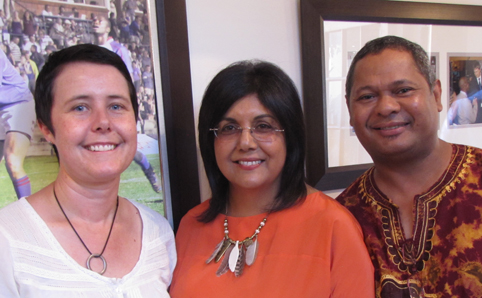Latest News Archive
Please select Category, Year, and then Month to display items
10 March 2022
|
Story Anthony Mthembu
|
Photo Unsplash
 The No Student Hungry team gearing up to start distributing food parcels to the selected students.
The No Student Hungry team gearing up to start distributing food parcels to the selected students.
The UFS is one of the many institutions of higher learning where food insecurity is an active issue. However, the
No Student Hungry Programme is one of the initiatives launched at the university to assist in fighting food insecurity at the institution.
The purpose of the programme
Since its inception in 2011, the initiative has assisted many students in acquiring a healthy meal. Additionally, the Food Environment Office also hands out food packages, so that students can continue to achieve academically. “We are trying to develop a healthy environment for students and make it easier for them to have a nice and healthy meal,” stated Annelize Visagie, who heads the Food Environment Office at the UFS. The Food Environment programme is spread out on all three campuses, each with its own facilitators. Furthermore, the programme mainly caters for students who are not funded by the National Student Financial Aid Scheme (NSFAS) but who are excelling academically. The abovementioned students apply for assistance online, and a list is then drawn up of students who receive assistance for the year.
Alternative solutions to keep the initiative running
On the Bloemfontein Campus, the No Student Hungry Programme will be catering for 200 students in the 2022 academic year, assisting them with a daily nutritious meal. Additional food parcels are also handed out to provide further assistance. “We give food parcels to the students on the list every Tuesday and Thursday at the Thakaneng Bridge,” Visagie highlighted. However, she argues that catering for the student population through this programme can be a challenge, as the demand for assistance is growing rapidly and the ability to assist is limited. The programme relies on partnerships and sponsors to assist the student body. In fact, the coordinators of the programme currently have a memorandum of understanding with Tiger Brands according to which they deliver around 100 food parcels for distribution.
In addition, the coordinators have put in place alternative measures to ensure that they can provide more food to students. “The
Kovsie Act Office, in partnership with the
Department of Sustainable Food Systems and Development, has started a food garden where healthy and nutritious produce are grown, in order to add value to the distribution,” she indicated. Although the programme can only assist to a point, students who are in desperate need of assistance are never turned away. In fact, the
Social Support Unit at Thakaneng Bridge usually assists students with food vouchers for a maximum of four days.
A commitment to teaching healthy eating habits
The programme is not only committed to curbing food insecurity, but also to ensuring that students have a healthy and balanced diet. As such, a booklet is being issued by the
Department of Nutrition and Dietetics in collaboration with the Department of Sustainable Food Systems and Development, which contains ways in which students can make a healthy meal using some of the ingredients offered in the food parcels.
“We want to teach students how to eat healthy in the cheapest way, because they don’t have a lot of money to buy expensive food products,” Visagie argued.
‘We need a story that will excite us all’
2012-03-09
 |
|
Attending the conversation were, from the left: Willemien Marais, Lecturer in the Department of Communication Science; Zubeida Jaffer; and Prof. Andre Keet, Director of the International Institute for Studies in Race, Reconciliation and Social Justice.
Photo: Amanda Tongha
9 March 2012
|
“From the stories of Afrikaner Nationalism and Black Consciousness to the stories of our Constitution and the 1995 Rugby World Cup… But now what do we have?”
This was the question posed by Zubeida Jaffer, recently appointed as the university's Writer-in-Residence. Do we need a new national narrative? was the issue addressed by Ms Jaffer in a talk presented as part of the Critical Conversations series hosted by the university’s International Institute for Studies in Race, Reconciliation and Social Justice. Ms Jaffer is an award-winning journalist and author of, amongst others, Love in a time of treason and Our Generation.
“We can’t change the past and we can’t keep on focusing on separate narratives; we need to find a story, a new national narrative with elements that could excite all of us,” she told an audience consisting of academics and students. She also referred to the changes that took place at the university. “I’m fascinated by what is happening here. It’s mind-boggling to see the changes.” Based on the UFS’ drive to find common ground, Ms Jaffer told the audience that research at universities could and should direct this search for a common South African story.
In reference to her own experiences as a community activist and journalist during apartheid, she urged students to become active citizens. “In my time students were the leaders; they gave direction to the national debate.”
Article (pdf format)